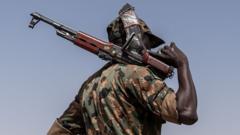Recent clashes have highlighted the strategic importance of Kordofan, especially after the RSF advanced following a series of battlefield wins, including the capture of the capital Khartoum. The government's military leader, Gen. Abdel Fattah al-Burhan, has focused efforts on retaking this territory in hopes of reclaiming control over Sudan's oil resources.
Kordofan comprises three states, home to nearly eight million people, with local ethnic groups embroiled in the fight. The situation has worsened due to airstrikes by the army, leading to civilian casualties and prompting backlash from the RSF, who have threatened to disrupt oil production should bombardments continue.
This turmoil has escalated fears that the civilian toll could rise further, highlighted by reports of atrocities on both sides. International humanitarian agencies have condemned the attacks on civilians, emphasizing that such violations have led to a catastrophic humanitarian disaster inside Sudan.
As the battle for Kordofan intensifies, with the possibility of further military action from the RSF, the implications of control over this region could drastically reshape the ongoing conflict. The anticipated confrontation at key locations like el-Obeid may determine the war's trajectory, making Kordofan a focal point for Sudan's future stability and governance.
With millions affected by this crisis, the world watches closely, as the strategies and outcomes here could redefine Sudan's wartime landscape and humanitarian conditions for years to come.
Kordofan comprises three states, home to nearly eight million people, with local ethnic groups embroiled in the fight. The situation has worsened due to airstrikes by the army, leading to civilian casualties and prompting backlash from the RSF, who have threatened to disrupt oil production should bombardments continue.
This turmoil has escalated fears that the civilian toll could rise further, highlighted by reports of atrocities on both sides. International humanitarian agencies have condemned the attacks on civilians, emphasizing that such violations have led to a catastrophic humanitarian disaster inside Sudan.
As the battle for Kordofan intensifies, with the possibility of further military action from the RSF, the implications of control over this region could drastically reshape the ongoing conflict. The anticipated confrontation at key locations like el-Obeid may determine the war's trajectory, making Kordofan a focal point for Sudan's future stability and governance.
With millions affected by this crisis, the world watches closely, as the strategies and outcomes here could redefine Sudan's wartime landscape and humanitarian conditions for years to come.




















